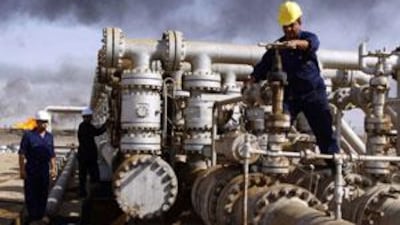Iraq has broken off talks with a Japanese consortium led by Nippon Oil over the development of its Nassiriya oilfield, intensifying doubts about the viability of Baghdad's ambitious plans to boost the country's oil output. After months of discussions, financing issues appear to have derailed the US$8 billion (Dh29.38bn) deal, which Baghdad had tried to negotiate outside the framework of the two oil licensing auctions it held last year.
"The talks reached a deadlock and we aren't going to meet again," said Abdul al Ameedi, the head of the Iraqi oil ministry's petroleum contracts and licensing directorate. Previously, Iraqi officials had said the biggest obstacles to finalising a contract with Nippon and its Japanese partners, the oil producer Inpex and the construction firm JGC, were financial. They included concerns over how Iraq would repay the foreign firms' costs for field development and handling workforce security and safety.
Nassiriya, which may contain nearly 5 billion barrels of oil reserves, ranks among Iraq's second tier of oilfields, falling just short of the 5-billion-barrels-plus "supergiant" status. Nevertheless, the oil ministry had hoped to see the field's current output, which may have fallen as low as 10,000 barrels per day (bpd), boosted many times over in the next few years. Nippon Oil had indicated it could raise production to 200,000 bpd within two years and had hoped eventually to pump 600,000 bpd to supply about 10 per cent of Japanese oil consumption.
Dhiya Jaafar, the head of the Iraqi government-owned South Oil Company (SOC), suggested Iraq might develop the field on its own. SOC planned to drill 10 new wells in Nassiriya this year to lift the field's output to 50,000 bpd by the end of the year, he said on Sunday. Yesterday, however, Mr al Ameedi said no decision had been taken on what to do with the field. The ministry might hold a "special bidding round" for Nassiriya later this year, when it would invite a number of international companies including Nippon to submit bids, he added.
The Iraqi oil minister, Dr Hussain al Shahristani, announced last June that the Japanese consortium had been chosen to develop the oilfield, after eliminating groups led by Italy's Eni and Spain's Repsol from the competition. Following the signing earlier this year of a number of oil contracts with foreign oil companies that had bid successfully in the licensing auctions, the minister said Iraq's oil production capacity could be raised to 12 million bpd from 2.5 million bpd within the next seven years, rivalling that of Saudi Arabia.
Mr Jaafar said yesterday that SOC and the foreign consortium of BP and China National Petroleum Corporation developing Iraq's largest oilfield, Rumaila, had awarded a $318 million contract to a unit of Turkey's state-owned Turkish Petroleum to drill 45 wells. Last week, however, Luay Jawad the executive director of Iraq Energy Institute, the London-based consulting firm that advises Baghdad on energy issues, said Iraq's deficit of more than $20bn this year cast doubt on the ability of its state oil companies, such as SOC, to pay their 25 per cent share of development costs for the new oil projects.
In a separate development yesterday, Dr al Shahristani said Baghdad was seeking discussions with the regional government of Iraqi Kurdistan over the terms of contracts the Kurds signed with foreign oil firms operating in their region before he would sanction payments to the companies for oil exports. "We have nothing to do with these companies," he said. "If we can discuss their contracts, that would be another story."
The minister's remarks dealt another setback to recently revived hopes that, with a national election set for Sunday, the Kurds and Baghdad might resolve a long-running dispute over oil jurisdiction that has halted exports from Kurdistan. The Kurdish government maintains it has a constitutional right to set the terms of contracts for oil and gas production from its territory without federal oversight.
Dr al Sharistani disagrees, and has called the deals "illegal". @Email:tcarlisle@thenational.ae

